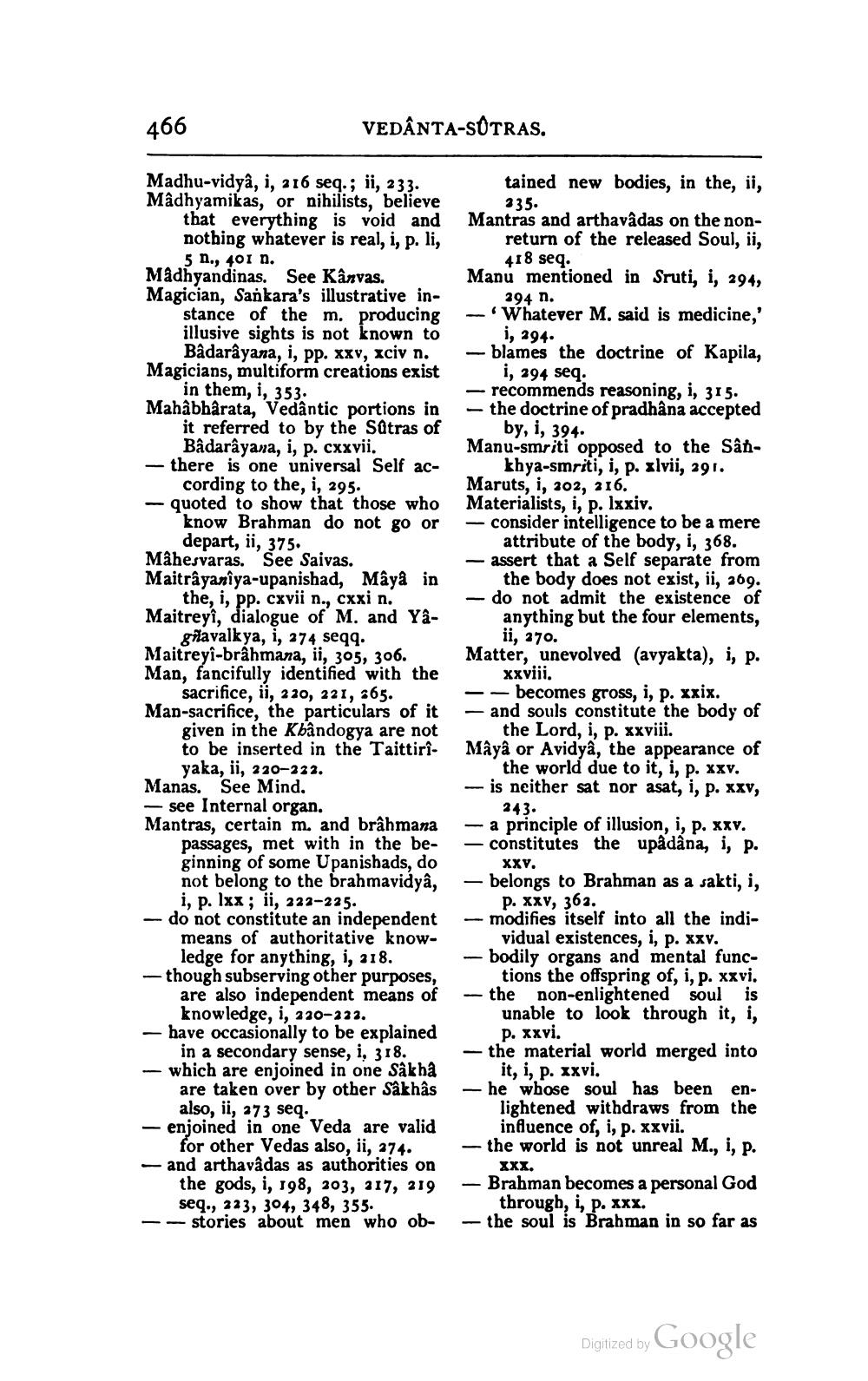________________
466
Madhu-vidyâ, i, 216 seq.; ii, 233. Mâdhyamikas, or nihilists, believe that everything is void and nothing whatever is real, i, p. li,
VEDANTA-SUTRAS.
5 n., 401 n. Madhyandinas. See Kânvas. Magician, Sankara's illustrative instance of the m. producing illusive sights is not known to Bâdarâyana, i, pp. xxv, xciv n. Magicians, multiform creations exist in them, i, 353. Mahâbhârata, Vedântic portions in it referred to by the Sutras of Bâdarâyana, i, p. cxxvii. - there is one universal Self according to the, i, 295. quoted to show that those who know Brahman do not go or depart, ii, 375. Mâhesvaras. See Saivas. Maitrâyanîya-upanishad, Mâyâ in the, i, pp. cxvii n., cxxi n. Maitreyî, dialogue of M. and Yâgavalkya, i, 274 seqq. Maitreyî-brâhmana, ii, 305, 306. Man, fancifully identified with the
sacrifice, ii, 220, 221, 265. Man-sacrifice, the particulars of it given in the Kbândogya are not to be inserted in the Taittirîyaka, ii, 220-222. Manas. See Mind.
see Internal organ. Mantras, certain m. and brâhmana passages, met with in the beginning of some Upanishads, do not belong to the brahmavidyâ, i, p. lxx; ii, 222-225. do not constitute an independent means of authoritative knowledge for anything, i, 218. -though subserving other purposes, are also independent means of knowledge, i, 220-222. - have occasionally to be explained in a secondary sense, i, 318. - which are enjoined in one Sâkhâ are taken over by other Sâkhâs also, ii, 273 seq. enjoined in one Veda are valid for other Vedas also, ii, 274. - and arthavâdas as authorities on the gods, i, 198, 203, 217, 219 seq., 223, 304, 348, 355. -stories about men who ob
Mantras and arthavâdas on the nonreturn of the released Soul, ii, 418 seq.
Manu mentioned in Sruti, i, 294, 294 n.
-'Whatever M. said is medicine,' i, 294.
blames the doctrine of Kapila, i, 294 seq.
-recommends reasoning, i, 315. - the doctrine of pradhâna accepted by, i, 394.
Manu-smriti opposed to the Sânkhya-smriti, i, p. xlvii, 291. Maruts, i, 202, 216. Materialists, i, p. lxxiv.
tained new bodies, in the, ii, 235.
consider intelligence to be a mere attribute of the body, i, 368. - assert that a Self separate from the body does not exist, ii, 269. do not admit the existence of anything but the four elements, ii, 270.
Matter, unevolved (avyakta), i, p. xxviii.
becomes gross, i, p. xxix. and souls constitute the body of the Lord, i, p. xxviii. Mâyâ or Avidyâ, the appearance of the world due to it, i, p. xxv. - is neither sat nor asat, i, p. xxv,
-
243.
- a principle of illusion, i, p. xxv. constitutes the upâdâna, i, p.
XXV.
belongs to Brahman as a sakti, i, p. xxv, 362.
modifies itself into all the individual existences, i, p. xxv. bodily organs and mental functions the offspring of, i, p. xxvi. the non-enlightened soul is unable to look through it, i, P. xxvi.
-
- the material world merged into it, i, p. xxvi.
-he whose soul has been enlightened withdraws from the influence of, i, p. xxvii. -the world is not unreal M., i, p.
-
XXX.
- Brahman becomes a personal God through, i, p. xxx. -the soul is Brahman in so far as
Digitized by Google




